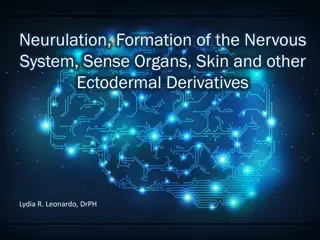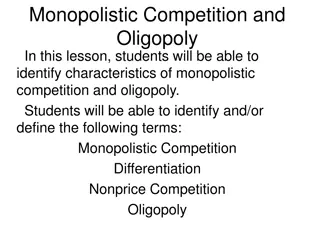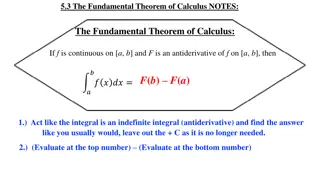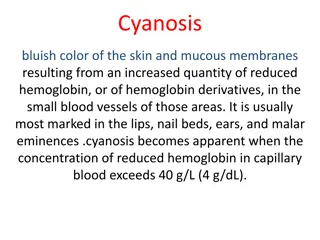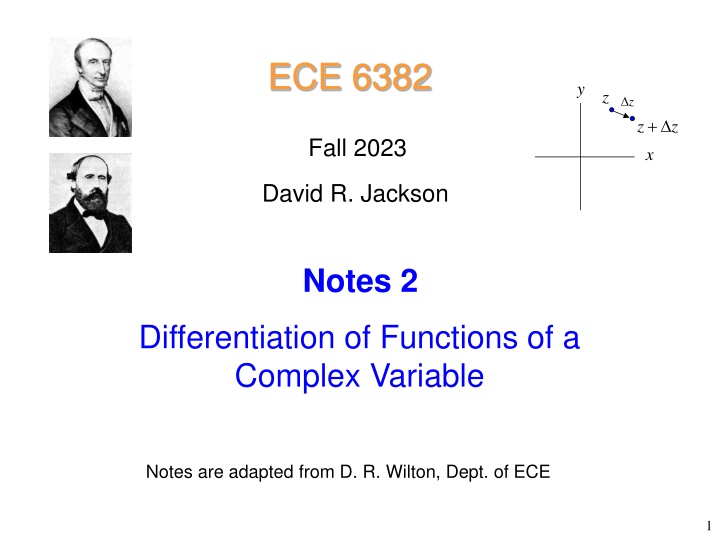
The Cauchy-Riemann Conditions for Complex Variables
Explore the Cauchy-Riemann conditions in complex variable differentiation, uncovering the necessary and sufficient conditions for existence and uniqueness of derivatives. Delve into the relationship between real and imaginary parts through a comprehensive analysis.
Download Presentation

Please find below an Image/Link to download the presentation.
The content on the website is provided AS IS for your information and personal use only. It may not be sold, licensed, or shared on other websites without obtaining consent from the author. If you encounter any issues during the download, it is possible that the publisher has removed the file from their server.
You are allowed to download the files provided on this website for personal or commercial use, subject to the condition that they are used lawfully. All files are the property of their respective owners.
The content on the website is provided AS IS for your information and personal use only. It may not be sold, licensed, or shared on other websites without obtaining consent from the author.
E N D
Presentation Transcript
ECE 6382 y z z + x z z Fall 2023 David R. Jackson Notes 2 Differentiation of Functions of a Complex Variable Notes are adapted from D. R. Wilton, Dept. of ECE 1
Functions of a Complex Variable ( ) f z = Function of a complex variable: w = = x iy, w + = = + z u + iv ( ) f z ( ) ( ) = ( ( ) ) ( ) = + w u z iv z u x,y iv x,y ( ) f z ( ) 2 2 2 = = ( e.g., , ) 2 z u x,y x - y , v x,y xy Examples of functions: 2 = a bz + + = sinh( ) w cz , w A z + a bz dz + n = = w , w z 2 + c ez = 0 n 2
Differentiation of Functions of a Complex Variable Derivative of a function of a complex variable: ( ) z ( ) f z + f z z df dz f z ( ) z = = = lim z lim z f 0 0 To define a unique derivative at a point , the limit must exist at must be independent of the direction o z z ( ) = f at arg z z z ( ) + y f z z v z ( ) f z z = w z ( ) f z + x w z z f u 3
The Cauchy Riemann Conditions ( ) f z ( ) ( ) = + Denote z x i y = = + w u x,y iv x,y = First, let : z x ( ) x ( ) f z + f z x df dz f x = = lim x lim x x,y 0 u x 0 ( ) x ( ) ( ) x ( ) + + u x,y v x x,y v x,y = + lim x lim x i 0 0 Augustin-Louis Cauchy df dz u x v x = + i = Next let : z i y ( ) ( ) f z + f z i y i y df dz f = = lim y lim y + i y u x,y 0 0 ( ) y ( ) ( ) y ( ) + y u x,y v x,y y v x,y = + lim y lim y i i i 0 0 Bernhard Riemann df dz v y u y u x v x v y u y = + = Question: Is ? i i i 4
The Cauchy Riemann Conditions (cont.) We found y = z i y z df dz u x v x df dz v y u y z = + = i i = z x x = z i y = z x For a unique derivative, these expressions must be equal. That is, a for the existence of a derivative of function of a complex variable is that necessary condition u x v y u y v x = = & Cauchy-Riemann equations df dz We've proved that if exists Cauchy-Riemann conditions. 5
The Cauchy Riemann Conditions (cont.) df dz Next, we prove that Cauchy-Riemann conditions exists (sufficiency): u x u y v x v y + + + x y i x y + f z u i v z = + x i y u x v x u y v y + + + i x i y Arbitrary direction z = + v x x i y u x v x u x Use C.R. conditions + + + i x i y Totaldifferentials : = ( ) ( ) u x,y x v x,y x u x,y y v x,y y + x i y + ( ) u x,y x y u x v x u x v x + + + i y ( ) i x i ( ) ( ) + ( ) v x,y x y = + x i y + u x v x ( ) + x i y + i u x v x y x ( ) 1 = = + = , independent of arg tan i z x i y 6
The Cauchy Riemann Conditions (cont.) Hence, we have the following equivalent statements: df dz exists Cauchy-Riemann conditions. or df dz if and only if exists (iff) the Cauchy-Riemann conditions hold. or necessary and sufficient df dz The Cauchy-Riemann conditions are a condition for the e xistence of the derivative of a complex variable . f 7
The Cauchy Riemann Conditions (cont.) We say that a function is "analytic" at a point if the derivative exists there (and at all points in some neighborhood of the point). y ( ) f z D if the derivative exsits at each point in . is said to be "analytic" in a domain D D x The theory of complex variables largely exploits the remarkable properties of analytic functions. The terms " holomorphic", "regular", and "differentiable" are also used instead of "analytic." 8
Applying the Cauchy Riemann Conditions Example 1 : ( ) ( ) u x,y v x,y ( ) f z ( ) = = + = + z x iy x i y u x v y v x = = 1 ( ) C.R. conditions hold everywhere for finite z u y = = 0 is analytic everywhere z Example 2 : ( ) ( ) v x,y u x,y ( ) f z ( ) ( ) = = + = X + z* x iy * x i y u x v y = = 1 1 nowhere C.R. conditions hold u y z* v x = = is analytic nowhere 0 9
Applying the Cauchy Riemann Conditions (cont.) y Example 3 : 1 z 1 + x iy x + D ( ) f z = = = x 2 2 x iy y + x + y = + i 2 2 2 2 x y x y 1 z = is analytic except at 0 z ( ) ( ? ) u x,y v x,y : 0 D z 2 ( 2 2 + 2 ( 2 2 2 2 x y y + 2 ) u x x y x v y = = = ) 2 2 2 2 2 + + x y x y 2 u y xy v x = = = = = C.R. conditions hold everywhere except 0 ( 0) x y z . ( ) 2 2 2 + x y ( ) f z = = is analytic everywhere except at The point is called a "singularity." 0 0 z . z A singularity is a point where the function is not analytic. 10
Applying the Cauchy Riemann Conditions (cont.) Example 4 : ( ) f z ( ) z ( ) ( ) i iy ( ) iy ( ) iy = = + = + sin sin sin cos x sin cos x iy x ( ) i iy y y + + e e e e ( ) iy = = = bu t cos cosh y, 2 2 ( ) i iy ( ) i iy y y e e i iy e e ( ) ( ) z = = = sin sinh iy i i y 2 2 ( ) = + = + so sin sin sin cosh x sinh cos x y i y x ( ) ( ) u x,y v x,y C.R. conditions hold for all finite u x v y u y v x = = = = cos cosh x sin sinh x y , y z u x v x ( ) z = + = Now use: cos cosh x sin sinh x f i y i y ( ) ) iy ( ) iy = = = cos cos x sin sin x iy ( z + cos cos x d dz ( ) z ( ) z = = sin cos f z 11
Differentiation Rules (cont.) Example ( ) z ( ) ( ) z 2 2 2 ( ) ( ) z 2 2 + 2z z + z + z z ( ) z d dz 2 = = lim z lim z z z 0 0 = + 2 lim z z z 0 = 2 z Note:The above brute-force derivation, directly using the definition of the derivative, is exactly what is done in usual calculus, with x being used there instead of z. 12
Differentiation Rules It is relatively simple to prove on a case-by-case basis that practically all formulas for differentiating functions of real variables also apply to the corresponding function of a complex variable: n az sin dz cos dz d z dz d e dz d z d z 1 n az = = = = cos sin etc. nz , ae , z, z, ( ) z d dz ( ) z 1 n n = every polynomial of degree , in is analytic (differentiable). , nz N P N z ( ) ( ) P z Q z except every rational function ( ) Q z here in is analytic z w vanishes. 13
Differentiation Rules Replacing by in the usual derivations for functions of a real variable, we find practically all differentiation rules for functions of a complex variable turn out to be identical to t hose for real variables: x z ( ) ( ) ( ) d f z g z ( ) z ( ) g z = f dz ( ) ( ) ( ) dz f z dz g z d f z g z ( ) ( ) z g z ( ) f z g z ( ) = + f ( ) ( ) d g f f g = ( ) g 2 14
A Theorem Related to z* If f = f (z,z*) is analytic, then f = 0 z* (An analytic function cannot vary with z*, and therefore cannot be a function of z*, except in a trivial way.) All functions that contain z* are therefore not analytic, except for some trivial cases (where the function does not really vary with z*). 15
A Theorem Related to z* (cont.) Examples: f ( ) f z = = is analytic nowhere, since (not independent of ) * 1 0 * z z * z f z ( ) f z ( ) unless ( = = * 0 = + is not analytic, since ) sin * cos 2 1 / 2 z z z n * f ( ) f z 2 unless ( = = = = is not analytic, since ) * 0 0 z zz z z * z f ( ) z ( ) z ( ) f z ( ) z unless ( = + = = * * is not analytic, since ) sin cos sin 0 z n * z * * z z f ( ) f z ( ) 1 = = = = is analytic everywhere, since 1 0 * * z z 16
Proof of z* Theorem If f = f (z,z*) is analytic, then f z* C.R. conditions: u x v x v y u y = 0 = (An analytic function cannot vary with z*, and therefore cannot really be a function of z*, except in a trivial way.) = Note that = x iy + = x iy z , z* Treating and as independent variables: z z* C.R. conds. ( ) ( ) = u z,z* x v z,z* y u z z x u z* x = v z z y v z* y = = = = + = + z* z* 1 1 = i i z* u z u v z v + = (1) i z* 17
A Theorem Related to z* (cont.) Similarly, C.R. conds. = = ( ) ( ) v z,z* x u z,z* y v z z x v z* x = u z z y i u z* z* y = = + = z* = 1 1 = i v z v u z u z* + = (2) i z* Next, consider from (2) from (1) f u z* v v z v u z v z u z u z* = + = + + + + i i i z* z* z* u z* v f f = + = = 0 i z* z* z* f z * is independent of 18
Entire Functions A function that is analytic everywhere in the finite* complex plane is called entire . Typical functionsthat are entire (analytic everywhere in the finite complex plane): 2 3 4 5 n 1 , z, z , z , z ,z , ,z , z sin cos sinh cosh e , z, z, z, z almost Typical functions analytic everywhere: 1 z 1 1 2 / , tan cot tanh coth , z , z, z, z, z 2 2 z 1 * A function is said to be analytic everywhere in the finite complex plane if it is analytic everywhere except possibly at infinity. = Let 1 w / z Analytic at infinity: Is the function analytic at w = 0? 19
Combinations of Analytic Functions Combinations of functions: Finite linear combinations of analytic functions are analytic: are analytic is analytic ( ) f z ,g z ,h z af z ( ) ( ) ( ) If ( ) ( ) + + bg z ch z Composite combinations of analytic functions are analytic: ( ) f z ,g z ( ) ( f g z If are analytic ) ( ) is analy tic 20
Combinations of Analytic Functions (cont.) Infinite series: Infinite series may be: - Analytic everywhere - Analytic somwhere The somewhere might depend on the form used to represent the function. Example: 1 The first form is analytic everywhere except z = 1. ( ) f z = 1 z The second form is analytic for |z| < 1 (the series does not converge on or outside the unit circle). ( ) f z 2 3 = + + + + 1 1 z z z , z 21
Combination of Analytic Functions (cont.) Examples Composite functions of analytic functions are also analytic. ( ) ( ) g z = = 2 f z z sin z ( ) z ( ) ( ) ( ) = = 2 sin h z g f z analytic Derivatives of analytic functions are also analytic (proof given later). ( ) ( ) z = = sin f z z cos f z analytic 22
Derivatives of Analytic Function Important theorem (proven later) The derivative of an analytic function is also analytic. ( ) f z is analytic ( ) z f is analytic Hence, all derivatives of an analytic function are also analytic. ( ) z f is analytic 23
Real and Imaginary Parts of Analytic Functions Are Harmonic Functions ( ) f z ( ) ( ) = + Assume an analytic function: u x,y iv x,y ( ) ( ) 2 2 = = 0 u x,y v x,y The functions u and v are harmonic (i.e., they satisfy Laplace s equation) ( ) ( ) v z ( ) = = = = u u z u x,y Notation: ( ) v v x,y This result is extensively used in conformal mapping to solve electrostatics and other problems involving the 2D Laplace equation (discussed later). Pierre-Simon Laplace 24
Real and Imaginary Parts of Analytic Functions Are Harmonic Functions (cont.) Proof f is analytic df / dzis also analytic (see slide 23) df dz u x f v x v y u y ( ) ( ) ( ) ( ) = + = = + Notation Analytic : f z u x,y iv x,y i i ( ) z + Denote U iV u x v y v x u y ( ) ( ) ( ) z ( ) = = = = = We have: Re ; U x,y f i V x,y i i ( ) z Apply the C.R. conditions to : f 2 2 U x V y u u 2 = 0 u = = 2 2 x y 2 2 V x U y v v 2 = 0 v = = 2 2 x y 25
Real and Imaginary Parts of Analytic Functions Are Harmonic Functions (cont.) ( ) f z 2 = = Example: w z ( ) ( ) ( ) 2 2 2 = + = + = + 2 w u iv x iy x y i xy ( ( ) ) 2 2 = u x,y x y = 2 v x,y xy 2 2 2 2 u u v v 2 2 = + = = = + = + = 2 2 0 u 0 0 0 v 2 2 2 2 x y x y 26
Real and Imaginary Parts of Analytic Functions Are Harmonic Functions (cont.) ( ) f z ( ) z = = sin w Example: ( ) = + = x iy + = y i + sin sin cosh x cos sinh x w u iv y ( ( ) ) = , sin cosh x u x y y = , cos sinh x v x y y 2 2 u u = + = + = 2 sin cosh x sin cosh x 0 u y y 2 2 x y 2 2 v v = + = + = 2 cos sinh x cos sinh x 0 v y y 2 2 x y 27




